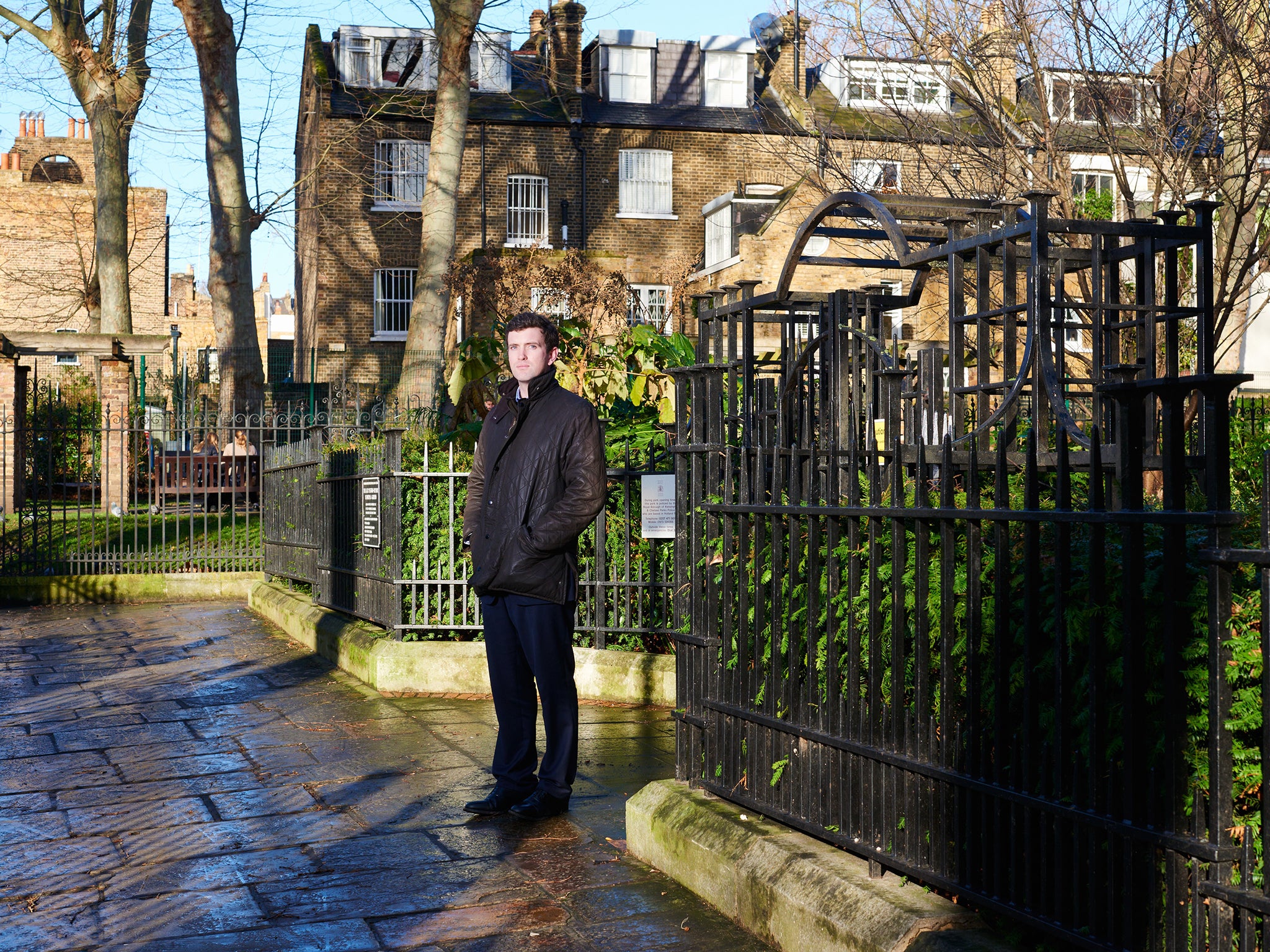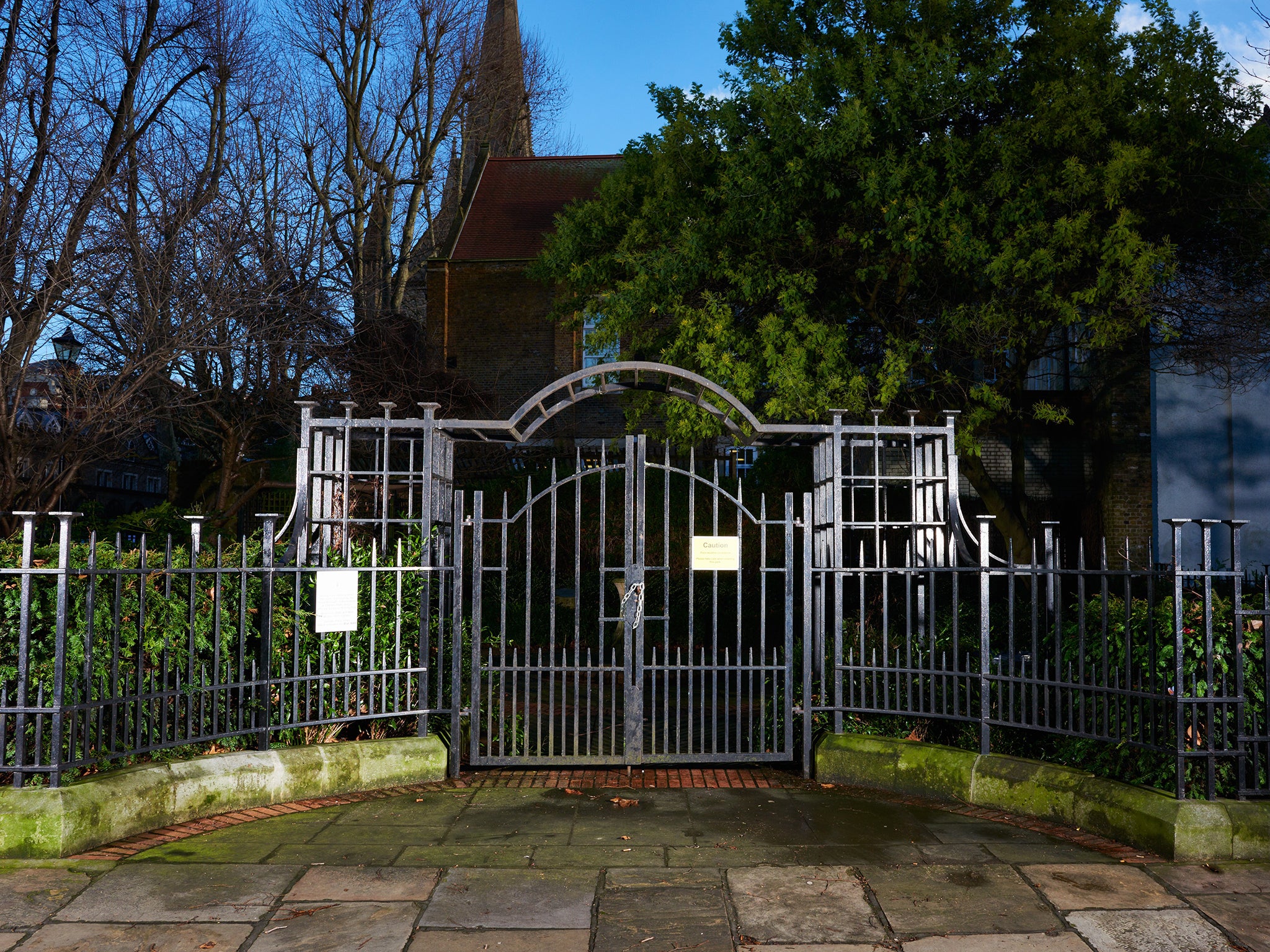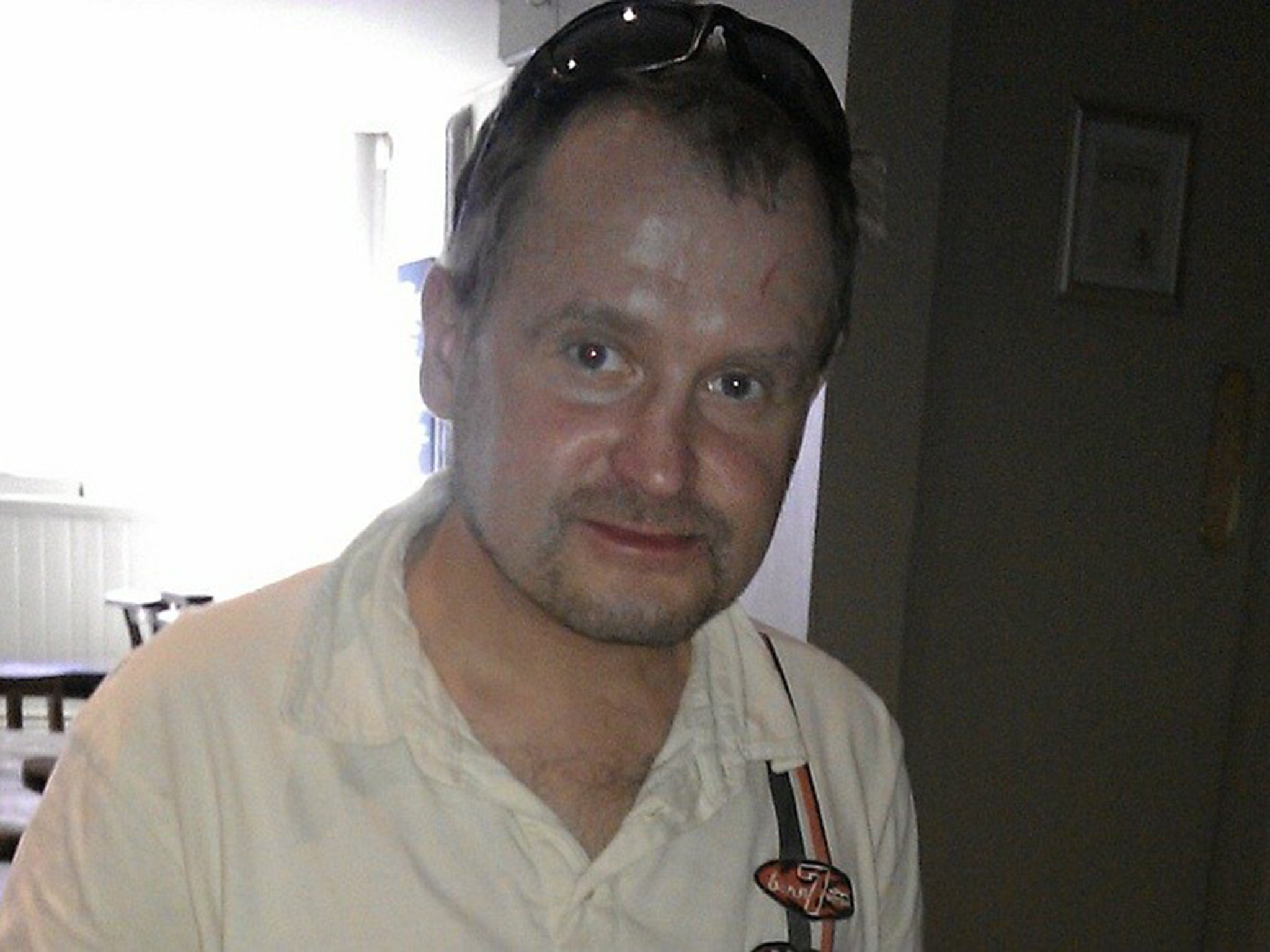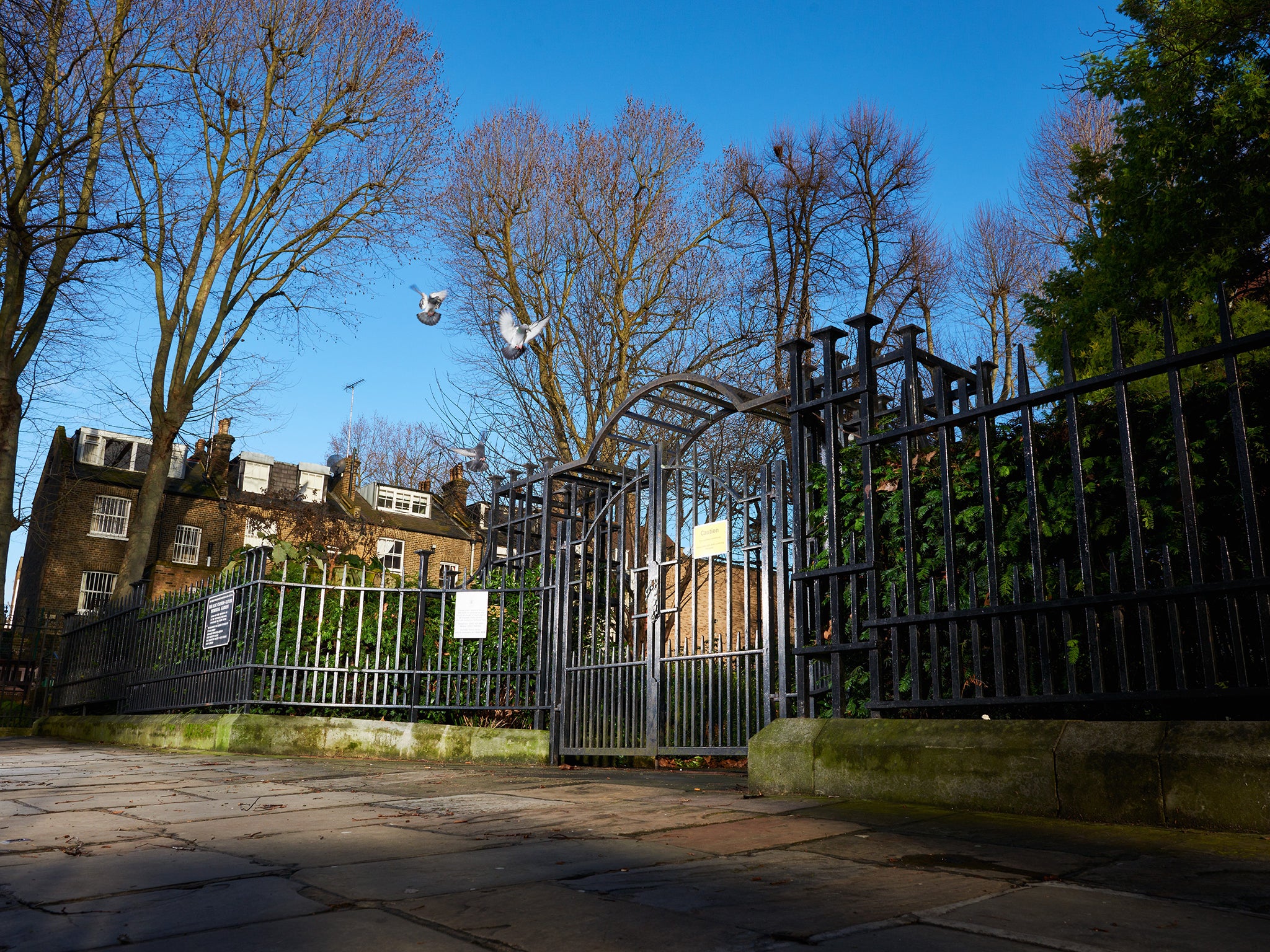A homeless man was found impaled on a spike in a square in London's Kensington - but who was he and why did he die?
When a homeless man's body was found in one of the richest corners of London, the city barely flinched. Simon Usborne tells the story of a man who passed through our capital - and was always passed by

Your support helps us to tell the story
From reproductive rights to climate change to Big Tech, The Independent is on the ground when the story is developing. Whether it's investigating the financials of Elon Musk's pro-Trump PAC or producing our latest documentary, 'The A Word', which shines a light on the American women fighting for reproductive rights, we know how important it is to parse out the facts from the messaging.
At such a critical moment in US history, we need reporters on the ground. Your donation allows us to keep sending journalists to speak to both sides of the story.
The Independent is trusted by Americans across the entire political spectrum. And unlike many other quality news outlets, we choose not to lock Americans out of our reporting and analysis with paywalls. We believe quality journalism should be available to everyone, paid for by those who can afford it.
Your support makes all the difference.Ed Boord's walk from the station to his office cuts through one of the wealthiest corners of London. Kensington Church Walk runs off Kensington High Street, behind St Mary Abbots, where Princess Diana used to pray under the city’s tallest spire. The quiet passage near Kensington Palace links a private members’ club, a sought-after primary school, and a line of boutiques, including one that only sells expensive Japanese kitchen knives.
“I was very early that day [6.25am, according to his statement to police] because I’d left some work at my desk that I needed for a meeting,” Boord recalls. He has agreed to retrace his steps this week, more than two months after a journey that would lead him to a therapist’s couch. “It was dark - really dark - but when I got to about here, I saw a sort of shape. I couldn’t tell what it was but I knew it was out of place.”
Boord, who’s 30, approaches the hip-high fence on the East side of the Walk. It surrounds a small garden popular with office workers and - occasionally - homeless people in need of a bench. Inside, a dense hedge is trimmed to the same height as the fence’s six-inch spikes. As Boord got closer, the shape became a man. His legs straddled the fence, which was wet after rainfall, and three spikes were obscured. An empty shoe had become stuck on the next spike, and the man’s upper body had slumped forward over the hedge. Blood pooled on the ground, and smeared a sign in reach of his left foot. “His hoodie was pulled up over his back, which was blue,” Boord adds. “I shouted at him but he was dead.”
It took a few hours for word of the incident to travel 50 metres to Northcliffe House, home to several newspapers including this one. “A rough sleeper died today after being impaled on the railings outside David Cameron's parish church,” one online story began. It appeared that the man had slept in the garden, and slipped while climbing out, bleeding to death. But that is all anyone else would learn. Man, dead, fence... homeless. It is the kind of story - horrible but apparently without consequence - that troubles us for minutes at most.
The next day the Walk is busy again, the blood washed away. Only a scrap of police tape suggests anything has happened. But while the man still lay here, Boord says, before the police and paramedics arrived, several people walking the other way did not notice him, because of the the way the body was postioned. “That was one of the things that I talked to the therapist about,” he says. “It upset me that someone like that spends their life not being noticed, and even in their last moments people still walk past.”
Who was the man? What was his name? Still in the Walk, I ask homeless people first. (Kensington and Chelsea, one of the richest areas in London, is among the ten boroughs with the most rough sleepers.) A woman with a dog and carrying two large bags did not know him. “People were saying it was Vinnie,” she says. “But I’ve just seen him outside Tesco.” Big Issue sellers, shopkeepers, dog walkers, people in the church: nobody knows anything. Some are not aware a man died here yesterday.

Five days after the death, a small bunch of flowers appears on a lamppost without a note. (It will disappear the next day.) Two women look at it. “In this borough you don’t expect things like that will happen,” says Aisha Gustavsson, a mother of children at the school, where the Prime Minister’s daughter is also a pupil. David, a gardener, is planting daffodils. “What a horrible way to go,” he says. He has heard a rumour that the man was local, and had a wife.
The police are treating the death as unexplained, and have passed the case to the coroner. Twelve days later, officers have found the man’s family. They can’t share their details, but they can name him: Pawel Koseda, 38, a Polish national. There is little to discover online, but one search result stands out. In March 2013, Nasze Strony, a Polish-language newspaper based in Peterborough, reported that a 37-year-old called Pawel Koseda was missing in London. The editor, Adam Andrzejko, later confirms that he was the same man. He sends a link to a profile page on a Polish social network. It only reveals one job: “Manager of Quality Control Section, Monsoon, from November 2010”. A separate profile mentions Memo Fashions. Monsoon does not comment but Memo, based in Acton, confirms that Pawel Koseda worked there briefly in 2013. Nobody remembers him.
Andrzejko is not surprised Koseda has died without anyone noticing. He sends a series of names of missing Polish people in Britain, and a story about Robert Grzelachowski, a homeless man who died last month in hospital in Warwick aged 42. “The body will be cremated and his ashes will rest in the cemetery,” it ends. “Another emigrant not to return to the country.”
Koseda’s fate is only slightly better. Eventually I find an email address for his brother. A month has now passed since the death. “I have read your letter on my tragically deceased brother Pawel, and as you wrote, this is a very difficult time for our family,” Wojciech Koseda replies via a translator. “Only a few days ago we brought him from London and buried him in a cemetery in Lodz. He was my only brother and I still cannot accept what happened that tragic night in Kensington.”
Wojciech says he had found his brother following the missing persons appeal in 2013, but that “his situation was not good.” He wants to check with his mother before saying any more. “For her this is a heavy-hearted moment,” he adds. I keep him up to date with this story in two further emails, but never hear anything more from him.

Westminster Coroner’s Court sets a date for Koseda’s inquest: 6 January. In the meantime, I take his name back to the Walk, but nobody has heard of it. Early on a cold, dark morning, Rowe, as he wants to be called, is sitting on a bench on the High Street. He has been here most days for 25 years, on and off, yet I had not noticed him. “I watched that being planted,” he says, pointing at the mature plane tree in front of him. After a period of work in Lincoln, Rowe came back here when his life and marriage fell apart following the death of his baby son. “I couldn’t cope and hit the drink,” he says.
Rowe is aware a man died on the fence, but knows nothing. He used to sleep in the gardens before new locks were fitted. “It was brilliant in there,” he says. As he talks it’s still dark and cold when a young man approaches, shivering violently. “No home, no home,” he says, pulling out a scrap of paper. “Hello, please help me to be taken to a London orphanage as I sleep on roads by strong cold rain and snow,” it reads. “God help me for that judgment day will not be in hell, thank you.” Rowe hands the man, who is Romanian, his cup of tea. He speaks barely a word of English, and neither of us can find the building he wants.
Of the 6,500 people seen sleeping rough by outreach workers in London in the year to last March, less than half (46 per cent) were British, according to the Chain database managed by St Mungo’s Broadway, the homeless charity. Romania and Poland now account for more than a quarter of rough sleepers in the city - a figure that has shot up in the 10 years since the EU began expanding eastwards and is mirrored in many British towns and cities.
Darek Karwacki is a Polish outreach worker based in Southwark, at a St Mungo’s support centre. On the 10pm to 2am shift, we drive around the borough looking for rough sleepers of all nationalities. Many have been reported by members of the public via Streetlink, a national service that links homeless people to local support. In the case of Eastern Europeans, says Karwacki, “reconnection” to a home country, for support and treatment in a first language, is often the best solution. But pride can be a barrier, as can broken relationships and drink, drugs or mental health problems.
I learn via Nasze Strony that in 2011, a Polish outreach worker with Thamesreach, another homeless charity, had encountered Koseda sleeping rough somewhere in London, but that he had turned down the chance to return to Lodz. The only other record is an encounter last July at a homeless support centre in Shepherd’s Bush, West London.

In the rubbish-strewn stairwell of a multi-storey car park in Peckham, a young British man has just injected heroin, and can’t speak. “We’ll come back,” says Karwacki, who is trying to get him mental health support. A couple of stops later, at London Bridge, we find an older man reclining on his bags in an entrance to a UK Border Agency office. Vassil, who is 51, is a Romanian builder. His father has died, and his marriage has broken down. “I work in Romania 28 years for nothing,” he says. He receives no benefits and has the documents to work - he just can’t get any.
Karwacki says the immigration debate makes it more difficult to gain the trust of Polish and Romanian rough sleepers, and get them home. “They often call us racist, he says. “‘Why are you waking me up, you just want to send me back home’.” The 38 year old is trying to launch a new project to provide care for high-risk rough sleepers, in their language, to make reconnection easier. He remembers a young Polish man whose money from begging went straight into a syringe. “We tried to explain that if he stayed in this situation… we were not saying he will die, but that was the risk.” Karwacki later travelled with the man back to Poland, where he is now in rehab and works at Marks & Spencer in Warsaw.
It is impossible to say how many people saw Pawel Koseda sleeping rough before Boord found him, but nobody tried to get him help. Petra Salva, director of outreach services at St Mungo’s Broadway, as well as StreetLink, says the inclination of most people is still to walk on by. “What does it say about our society that it’s taken a death for you to write about this?” she asks. “Unless the public are outraged and stop being desensitised to the sight of someone on the pavement, rough sleeping will not change.”
Three visitors arrive for Pawel Koseda’s inquest at Westminster Coroner’s Court: the police detective who dealt with the case, me, and a man who looks unhappy. DC Thomas Norman tells the coroner, Dr Fiona Wilcox, that he found a half-empty bottle of red wine in a bag on the hedge by the body, and a matching, empty bottle in the bin by the bench. The toxicology report confirms that Koseda had very high levels of alcohol in his system. He was wearing hospital pyjamas under his clothes, and a scar on his head indicated that he had undergone skull surgery. He died soon after two spikes penetrated his thigh and abdomen, the latter severing an artery. Cause of death: accidental. “He was a very young man to have died in this manner,” Wilcox tells the other man, who nods.
I approach him outside. Ziggy Denis is Pawel’s cousin. He owns a small construction company and has lived in London for 13 years. “Do you know that Pawel was a teacher at a university in Lodz?” he asks. “He was such a bright, intelligent man - one of the best students at his university - but alcohol addiction ruined everything.” Denis thinks Koseda came to Britain about 10 years ago, and says he had no wife or children. He does not know when or why his drink problem developed, and says Pawel cut contact with his family years ago. “His mother tried to get him out of this mess but it was not possible, and this is the consequence.”
Denis first learned about the death hours after it happened. “I was driving the car and heard it on the radio and I said, ‘What the hell’,” he remembers. It would be days before he learned the man was his cousin. Ten days before the death, he had received a call from the police. Koseda was at St Mary’s Hospital after falling and hitting his head. Denis stayed there for three days until his cousin began to recover from surgery. “The next day he escaped from hospital,” he says. He died a week later, a 30-minute walk away, past Kensington Palace.
Sheltering from rain inside the church beside the Walk, Ed Boord, who lives not far away in Parson’s Green, is relieved to learn more about the man on the fence. Three days after the discovery, he broke down on a Tube train, and wept for almost an hour. “It was the most emotional I think I’ve ever been - extraordinary,” he says. He feels better now after two therapy sessions, and wants to do something to support homeless charities. “We get so ingrained in our London lifestyle,” he adds. “We’re so bloody selfish.”
Denis, who lives in North Finchley and has a young daughter, hopes his cousin’s family in Poland can recover. “They lost a brother and son - this is a disaster for them,” he says. In the meantime he wants to move on and think about the Pawel he knew. “He was a great guy. When we were younger we spent holidays together. This is what I will remember about him.”
To alert outreach teams to a rough sleeper, go to www.streetlink.org.uk
Join our commenting forum
Join thought-provoking conversations, follow other Independent readers and see their replies
Comments